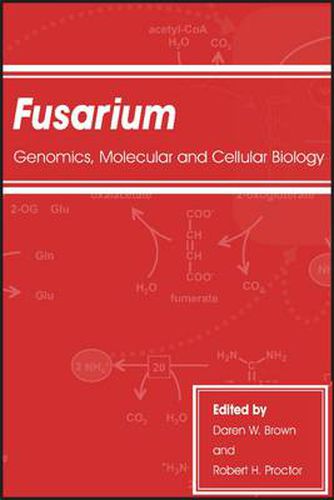Readings Newsletter
Become a Readings Member to make your shopping experience even easier.
Sign in or sign up for free!
You’re not far away from qualifying for FREE standard shipping within Australia
You’ve qualified for FREE standard shipping within Australia
The cart is loading…






The fungus Fusarium is a major plant pathogen that causes disease in nearly every agriculturally important plant. In addition, some strains produce mycotoxins that can cause serious illness in humans and livestock. The enormous economic importance of, and health hazards posed by, Fusarium have fuelled research by scientists worldwide into its biochemistry, genetics, genomics, proteomics, and metabolomics. The primary aim of this research is the identification of strategies to reduce crop diseases and the risks posed to human and animal health. The wealth of information derived from this research has allowed Fusarium to serve as a model system for eukaryotic biology, permitting tremendous advances in the understanding of the genetic and biochemical processes involved in the fungus-plant interaction, fungal pathogenesis, toxin biosynthesis, genome plasticity, and adaptive evolution to ecological niches. In this book, an international group of researchers critically reviews the most important current research on the genomics and molecular and cellular biology of Fusarium. The opening chapter provides a fascinating introduction to the organism. Subsequent chapters deal with: sex and fruiting * genome structural dynamics * molecular genetics and genomic approaches to study pathogenesis in wheat * proteomic analysis of the fungus-host interaction * repeat-induced point mutation, DNA methylation, and heterochromatin in Fusarium graminearum (Gibberella zeae) * the nitrogen regulation network and its impact on secondary metabolism and pathogenicity * diversity of polyketide synthases * plant responses to Fusarium metabolites. This volume will be essential for everyone working with Fusarium and other filamentous fungi. It is recommended for all biology, agriculture, and medical libraries. *** .. .produced and edited to the highest of standards. –IMA Fungus *** .. .a concise and highly updated overview of recent research in the genetics of Fusarium. – Quart. Rev. Biol. [Subject: Mycology, Microbiology, Genomics, Pathogenicity, Life Science, Agricultural Studies]
$9.00 standard shipping within Australia
FREE standard shipping within Australia for orders over $100.00
Express & International shipping calculated at checkout
The fungus Fusarium is a major plant pathogen that causes disease in nearly every agriculturally important plant. In addition, some strains produce mycotoxins that can cause serious illness in humans and livestock. The enormous economic importance of, and health hazards posed by, Fusarium have fuelled research by scientists worldwide into its biochemistry, genetics, genomics, proteomics, and metabolomics. The primary aim of this research is the identification of strategies to reduce crop diseases and the risks posed to human and animal health. The wealth of information derived from this research has allowed Fusarium to serve as a model system for eukaryotic biology, permitting tremendous advances in the understanding of the genetic and biochemical processes involved in the fungus-plant interaction, fungal pathogenesis, toxin biosynthesis, genome plasticity, and adaptive evolution to ecological niches. In this book, an international group of researchers critically reviews the most important current research on the genomics and molecular and cellular biology of Fusarium. The opening chapter provides a fascinating introduction to the organism. Subsequent chapters deal with: sex and fruiting * genome structural dynamics * molecular genetics and genomic approaches to study pathogenesis in wheat * proteomic analysis of the fungus-host interaction * repeat-induced point mutation, DNA methylation, and heterochromatin in Fusarium graminearum (Gibberella zeae) * the nitrogen regulation network and its impact on secondary metabolism and pathogenicity * diversity of polyketide synthases * plant responses to Fusarium metabolites. This volume will be essential for everyone working with Fusarium and other filamentous fungi. It is recommended for all biology, agriculture, and medical libraries. *** .. .produced and edited to the highest of standards. –IMA Fungus *** .. .a concise and highly updated overview of recent research in the genetics of Fusarium. – Quart. Rev. Biol. [Subject: Mycology, Microbiology, Genomics, Pathogenicity, Life Science, Agricultural Studies]